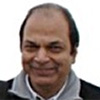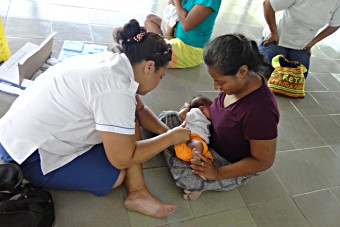
Raj Kumar
GAVI senior program manager
2013

A typical vaccination outreach session at a village maneaba. Kiribati is the smallest and most remote country to receive GAVI support. 103,000 people live across three islands. On May the 6, 2013, Kiribati launched the pneumococcal vaccine.
Photo credit: GAVI/2013/Raj Kumar
With 103,000 people living across three islands, Kiribati is the smallest and most remote country to receive GAVI support. Its position close to the international dateline and the equator make the group of islands, spread across 3.5 million square kilometres, one of the most difficult to access by people or vaccines.
I was honoured to be the first GAVI staff member ever to visit this mesmerising country to participate in the launch of the pneumococcal vaccine for the children of Kiribati.
More than half the population resides in the capital, Tarawa, which boasts just one road. There is no television or a regular newspaper – although a vernacular bulletin comes out once a month. Telephone and internet connectivity are challenging. Kiribati exists almost in a world of its own, unworried and untroubled by global security and economic issues.
The commitment to maternal and child health services in the country is amazing. Every child receives pentavalent vaccine and vaccinators do not know of any child who has not received the vaccine. They can be sure because they know everyone, communities are like large families and everyone is on their minds. The society is egalitarian and hierarchy is not important.
The pneumococcal vaccine launch event on 6 May was an impressive, traditional spectacle. Anybody and everybody who matters in the health sector were there. What was more impressive was that next day the vaccination was being done in three facilities I visited. The approach was simple. At Santo Ioane health centre, after vaccinating many children, two nurses Utinia Dennis and Lavender Tineon assisted by a Nurse aide Terengaoiti Toteri went to an outreach site two kilometres away and immunised more children, followed by house visits to ones who did not turn up.
The outreach sites are located at ‘maneabas’ (or meeting sites) which are the largest buildings in the villages and centre of village life, and the basis of island and national governance. Through this system, pneumococcal vaccine was effectively rolled out all over Kiribati in just one week!
Next day we took a one hour boat ride to go to Abaokoro on other end of L-shaped island of Tarawa. The School Health Nurse Miriaa had completed the vaccination in the centre and had plans for rest of the week to cover four other locations to get to 57 children in her area. Every child had taken BCG and Hepatitis B vaccine at birth.
Equally interesting was that each of three centres we visited had new child cards and registers to record pneumococcal vaccination. There were brand new posters with new schedule; all provided by LDS Charities, a faith based organization in Kiribati with a significant following. LDS is working closely with the Government to create an enabling environment and demand for vaccines across Kiribati - a good example of Government and CSO working together.
Does this mean Kiribati faces no challenges? No. The vaccine store is far from ideal. In the stores were three boxes of 1 ml. auto disable syringes and no one knew why they had been delivered to Kiribati. Also, according to GAVI’s eligibility threshold, Kiribati is no longer eligible for any new support as its per capita income is $2,030. However, the cost of living is high. So if one looks at PPP income, Kiribati drops more than ten places in the international economic rankings, below many other countries still eligible for GAVI support. This is a difficult situation. The Government can certainly sustain pentavalent and pneumococcal vaccines but other new vaccines would be a challenge, both in terms of financial resources and in-country technical expertise.
Towards end of my visit I felt in love with this new world, the like of which I never before encountered. For me, the smallest GAVI-eligible country is also one of the most fascinating. I am proud that the children of Kiribati are not being forgotten and will benefit from the power of vaccines.
Raj Kumar is a Senior Country Responsible Officer at the GAVI Alliance. AusAid is a major supporter of GAVI and its mission to immunise an additional 250 million children in developing countries by 2015, saving an estimated four million lives.
